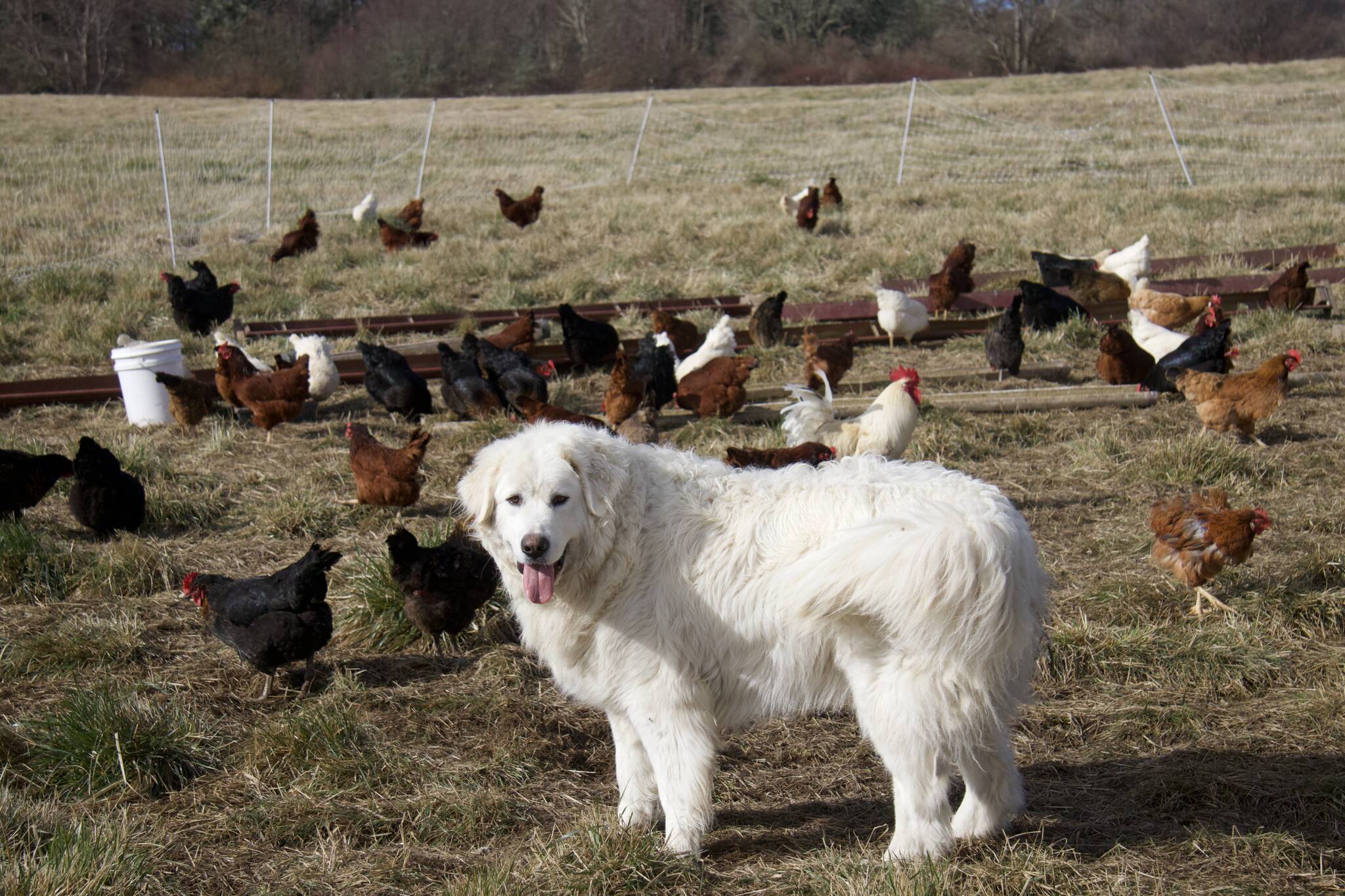Dogs that live outside and guard livestock became a hot topic on the island back in December when a Facebook post on the Whidbey Island Community page garnered a lot of attention.
The person who made the post was concerned about a dog on Greenbank Farm that was outside all of the time in the cold weather. The post received over 200 comments and led to a lively discussions about the topic of animals that guard livestock. A number of farms on Whidbey Island have had or currently have llamas or specialized breeds of dogs that live alongside and protect sheep.
At least two farms on the island also have special dogs specifically trained to protect livestock of the feathered variety.
Mark Stewart, owner of One Willow Farm, owns the dog that sparked the discussion on social media. Cooper is a livestock guardian dog and lives outside to protect the farm’s chickens from predators. One Willow Farm raises chicken for meat and eggs, as well as turkeys. At the height of their busy season, Stewart and his wife Melissa have about 1,000 birds. The couple leases land on Greenbank Farm to house the animals.
Stewart commented on the Facebook post and did his best to explain, over the internet, that Cooper is an Anatolian shepherd and Great Pyrenees mix and was bred to live outside. A descendant of mountain dogs, he has a thick double coat. Cooper’s parents were also working dogs. Both Anatolian Shepherds and Great Pyrenees have historically been guardian dogs, bred to protect livestock such as goats, sheep and chickens from predators.
“I think people forget that dogs had jobs before people domesticated them and brought them into the house,” Stewart said.
Because of Cooper’s coat, Stewart is actually more worried about the heat than the cold affecting him. In the warmer months, Cooper’s shelter gives him a cool, shady place to lie down. It doesn’t get cold enough on the island to bother him. When the Facebook discussion happened, Stewart double-checked with Cooper’s vet to make sure his shelter was adequate, which she said it was.
“The original question that was posted was a very legitimate question,” Stewart said.
Cooper does not stay in his pen all the time. Stewart visits the farm twice a day to let him out and feed him. Some people thought he was abandoned, Stewart said, which is definitely not the case.
Cooper is protecting his chicken friends primarily from coyotes. He also keeps an eye on birds like ravens who will steal eggs. Cooper’s bark is loud and ferocious enough to deter anything, Stewart said.
“He makes enough raucous and postures in such a way that it scares the coyotes off and that’s what we want,” he said.
Since Cooper is only one and half years old and still in training, he is kept in a separate pen from chickens. He thinks the birds are toys and has accidentally killed about 15 of them from over-enthusiastic playing. When Cooper is older and fully trained, the plan is to have him in the same pen as the chickens. Stewart estimates that will happen in about a year.
A lot of work goes into training him, Stewart said. Cooper is also their first first livestock guardian dog, so they didn’t have the luxury of having an older dog to help train him.
Stewart follows guidelines from A Greener World, an organization that promotes sustainable farming and has peer-reviewed standards for livestock guardian dogs such as breed selection, training, health management and shelter.
“The problems and the headaches (Cooper) causes me pay off in the fact that I know he’s protecting these guys from predators, especially with how expensive things are nowadays,” he said.
Animals are an expensive investment and he said Cooper acts as his insurance policy.
Brooke Crowder, owner of 1902 Ranch in Coupeville, shares a similar sentiment. She owns three working dogs to protect her flock of chickens from coyotes, raccoons and eagles. Before she had the dogs, she once saw an eagle pick up one of her chickens and fly away with it.
Lars and Bodhi are two-and-half-year old Great Pyrenees and Maremma Sheepdog mixes. The newest addition to the family is Murphy, a 7-month-old St. Bernard and Pyrenees mix. Lars and Bodhi are brothers from the same litter, and Crowder wanted a third dog to break up the sibling squabbles.
She said guard dogs need to bond with the animals they protect.
“As puppies, dogs will chase just about anything that runs, including chickens, and you have to be there to stop the behavior and correct it,” she said.
Their training takes years but after two years, she said all the hard work starts to pay off. The development of the two older dogs, Lars and Bodhi, has grown significantly over the last six months.
There is no question that pups are a necessity for the farm.
“If we didn’t have the dogs, we would have significantly more loss, and I question if we could provide eggs and make an income,” she said.



